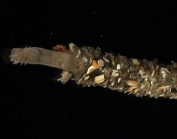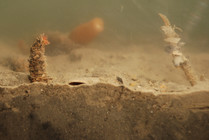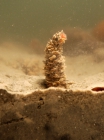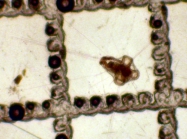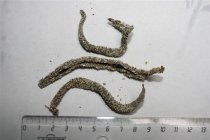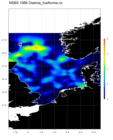| Introduction | | Species lists | | Search taxa | | Taxon tree | | Literature | | Distributions | | Statistics | | Editors | | Match taxa | | Webservice | | Log in |
WoRMS taxon detailsOwenia Delle Chiaje, 1844
129427 (urn:lsid:marinespecies.org:taxname:129427)
accepted
Genus
Owenia fusiformis Delle Chiaje, 1844 (type by monotypy)
Ammochares Grube, 1846 · unaccepted (subjective synonym)
Mitraria Müller, 1851 · unaccepted (plankton larval stage belonging...)
plankton larval stage belonging to Oweniidae, including Owenia Ops Carrington, 1865 · unaccepted (subjective synonym)
marine,
recent only
feminine
Delle Chiaje, S. (1841-1844). Descrizione e notomia degli animali invertebrati della Sicilia citeriore osservati vivi negli anni 1822-1830. <em>Batteli & Co., Naples.</em> Parts 1-8., available online at https://www.biodiversitylibrary.org/bibliography/10031#/summary
page(s): v.8, p.31 (1844), plate 175 [details]
Note Type species: O. fusiformis delle Chiaje, 1844...
From editor or global species database
Type species Type species: O. fusiformis delle Chiaje, 1844 [but often seen as 1841, e.g., in Fauchald (1977)]. [details]
Etymology Not stated, but assumed to be in recognition of Sir Richard Owen, contemporary to Delle Chaije. Hansson's BEMON, Etymology...
Etymology Not stated, but assumed to be in recognition of Sir Richard Owen, contemporary to Delle Chaije. Hansson's BEMON, Etymology of Marine Organisms, lists Owenia as a name relating to the famous 19thC British Museum anatomist. [details] Homonymy Senior homonym to Owenia Prosch, 1849 in Cephalopoda, Cranchiidae (squid). Owenia Prosch has been replaced by Teuthowenia...
Homonymy Senior homonym to Owenia Prosch, 1849 in Cephalopoda, Cranchiidae (squid). Owenia Prosch has been replaced by Teuthowenia Chun, 1910. There is also Owenia Gray 1855 in Aves. All three genera are assumed named to recognize Sir Richard Owen of the British Museum. There is also a junior plant kingdom genus Owenia Mueller, F.J.H (1857), which is a genus of trees in the family Meliaceae, and endemic to Australia. [details]
Read, G.; Fauchald, K. (Ed.) (2024). World Polychaeta Database. Owenia Delle Chiaje, 1844. Accessed through: World Register of Marine Species at: https://www.marinespecies.org/aphia.php?p=taxdetails&id=129427 on 2024-11-15
Date action by
original description
Delle Chiaje, S. (1841-1844). Descrizione e notomia degli animali invertebrati della Sicilia citeriore osservati vivi negli anni 1822-1830. <em>Batteli & Co., Naples.</em> Parts 1-8., available online at https://www.biodiversitylibrary.org/bibliography/10031#/summary
page(s): v.8, p.31 (1844), plate 175 [details] original description (of Mitraria Müller, 1851) Müller, Johannes. (1851). Über die Jugendzustände einiger Seethiere. <em>Bericht über die zur Bekanntmachung geeigneten Verhandlungen der Konigl. Preuss. Akademie der Wissenschaften zu Berlin.</em> [year 1851]: 468-474., available online at https://biodiversitylibrary.org/page/11056580 page(s): 468; note: description without figures, no species name with genus [details] original description (of Ammochares Grube, 1846) Grube, Adolph-Eduard 1846. Beschreibung neuer oder wenig bekannter Anneliden. Zweiter Beitrag: Corephorus elegans Gr., Ammochares Ottonis Gr., Dasymallus caducus Gr., Scalis minax Gr. Archiv für Naturgeschichte, Berlin, 12: 161-171,plate 5, available online at http://www.biodiversitylibrary.org/page/13704924 page(s): 163 [details] original description (of Ops Carrington, 1865) Carrington, Benjamin. (1865). On the chaetopod annelides of the Southport sands. <em>Proceedings of the Literary and Philosophical Society of Manchester.</em> 4: 176-188., available online at https://biodiversitylibrary.org/page/48862346 page(s): 187 [details] basis of record Bellan, G. (2001). Polychaeta, <i>in</i>: Costello, M.J. <i>et al.</i> (Ed.) (2001). European register of marine species: a check-list of the marine species in Europe and a bibliography of guides to their identification. <em>Collection Patrimoines Naturels.</em> 50: 214-231. (look up in IMIS) [details] additional source Day, J. H. (1967). [Sedentaria] A monograph on the Polychaeta of Southern Africa. Part 2. Sedentaria. British Museum (Natural History), London. pp. 459–842., available online at http://www.biodiversitylibrary.org/bibliography/8596 [details] additional source Fauchald, K. (1977). The polychaete worms, definitions and keys to the orders, families and genera. <em>Natural History Museum of Los Angeles County: Los Angeles, CA (USA), Science Series.</em> 28:1-188., available online at http://www.vliz.be/imisdocs/publications/123110.pdf [details] identification resource Koh, Byoung-Seol; Bhaud, Michel R. (2003). Identification of new criteria for differentiating between populations of <i>Owenia fusiformis</i> (Annelida Polychaeta) from different origins: rehabilitation of old species and erection of new species. <em>Vie et Milieu.</em> 53(2-3): 65-95., available online at https://wwwphp.obs-banyuls.fr/Viemilieu/index.php/volume-53-2003/53-issues-2-3/532-3-article-1.html [details] Available for editors  Present Present  Inaccurate Inaccurate  Introduced: alien Introduced: alien  Containing type locality Containing type locality
From editor or global species database
Etymology Not stated, but assumed to be in recognition of Sir Richard Owen, contemporary to Delle Chaije. Hansson's BEMON, Etymology of Marine Organisms, lists Owenia as a name relating to the famous 19thC British Museum anatomist. [details]Grammatical gender Feminine. No masculine Owenia species names have been created, although the genus may have been named after Sir Richard Owen. Owenia has a feminine suffix. [details] Homonymy Senior homonym to Owenia Prosch, 1849 in Cephalopoda, Cranchiidae (squid). Owenia Prosch has been replaced by Teuthowenia Chun, 1910. There is also Owenia Gray 1855 in Aves. All three genera are assumed named to recognize Sir Richard Owen of the British Museum. There is also a junior plant kingdom genus Owenia Mueller, F.J.H (1857), which is a genus of trees in the family Meliaceae, and endemic to Australia. [details] Type species Type species: O. fusiformis delle Chiaje, 1844 [but often seen as 1841, e.g., in Fauchald (1977)]. [details]
|

